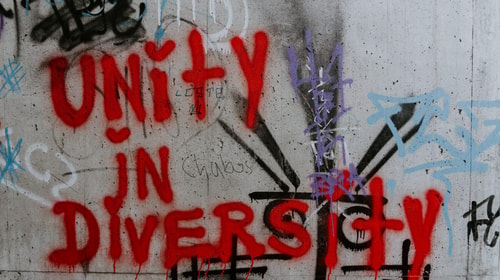We live in a culture of divides. Divided by language, nationality, race, class, political party. I was recently at a football match where the fans around me were screaming abuse at the opposition’s supporters, even though they were hundreds of metres away and out of earshot. We love to belong to something, and we like to feel that we have supported the right team, with the right sort of people.
In our world, our differences are often used as a means to create distance between us. But God intends His people to come together in “complete unity” (John 17:23), and I want to suggest that we flourish as humans when we are united with those who are different to us because it is then that we better reflect the three-in-one God whose image we bear.
The evangelical landscape
The term evangelical has been confused and marred over time, but at its heart evangelicalism means that we believe the Bible is God-breathed, Jesus is central, and the true story of Jesus is good news worth sharing. We seek to know God, serve the people He created and live for Him.
If we look at the landscape of the evangelical church across the UK, differences are easy to see. But if we love each other in and through these differences in expression, we tell the world of the power of Jesus and paint a picture of His kingdom to come. There are some big differences, but far more important are the things we have in common. Jesus has met each of us in our unique differences and rescued us, by grace alone, through faith alone.
The beauty of God’s people is that while we all have personal relationships with the living God, and differences in expression, we are united by His Spirit. We are individual image-bearers of God, and yet we are united as the singular body of Jesus Christ. Jesus unites people who would otherwise have nothing in common, “Just as a body, though one, has many parts, but all its many parts form one body, so it is with Christ,” (1 Corinthians 12:12) and in this His glory is displayed.
Loving disagreement
I consider myself incredibly fortunate that I have experienced a fair bit of variety when it comes to flavours of evangelical churches and Christian community. It is in trusting, loving discussion with Christians I disagree with on certain secondary theological issues where I have most experienced a foretaste of heaven. We have different opinions, different experiences, and yet we both love Jesus and find our purpose in Him, and therefore are united. We share “one Spirit so as to form one body” (1 Corinthians 12:13) and are both being shaped to look more like Jesus. We have much to learn from each other. When we love those who are different to us, we tell the world that Jesus is the real deal.
A few ways to disagree well:
- Know what you think and why
It is important to dig into God’s word and ask for the Spirit’s help to draw our own conclusions on secondary issues, to make sure we’re not just being swept along with our own church’s culture. Over time, as I have wrestled with God’s word, He has moulded me and changed my thinking on certain topics.
- Be loving to and about them
When it comes to Christian unity, one of the best pieces of advice I have ever heard is to never scoff or snigger at someone who one day you will be praising Jesus alongside in the new creation. Speaking disparagingly about them behind their back does not honour the body of Christ. Challenge yourself but also your friends in this. It is far easier to join in with mockery than to lovingly defend your brother or sister in Christ, but do it anyway.
- Be open minded
Echo chambers help no one, and when we challenge each other’s thinking as brothers and sisters, not as enemies, we flourish. Be confident in your salvation and the salvation of, and love of God’s word, in the one sitting across from you. Be interested to hear how God is at work in their lives, and what He might be teaching you through His Spirit in them.
United for eternity
When we see Christians from different evangelical traditions to us not as opposing teams, but as different parts of the same body, we better reflect the relational God we worship, as we are called to be “one as [God the Father and Jesus] are one” (John 17:22). We are designed for relationship and to sit alongside those who are different from us. Of course, in heaven we might find out who “got it right” – but what’s so amazing is we will not care one bit. We will be too busy praising Jesus around His throne.
"We are designed for relationship and to sit alongside those who are different from us."



